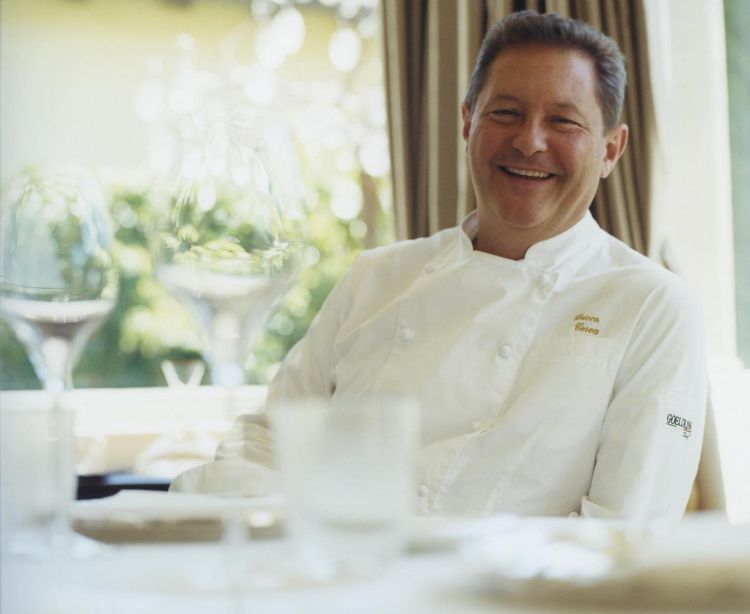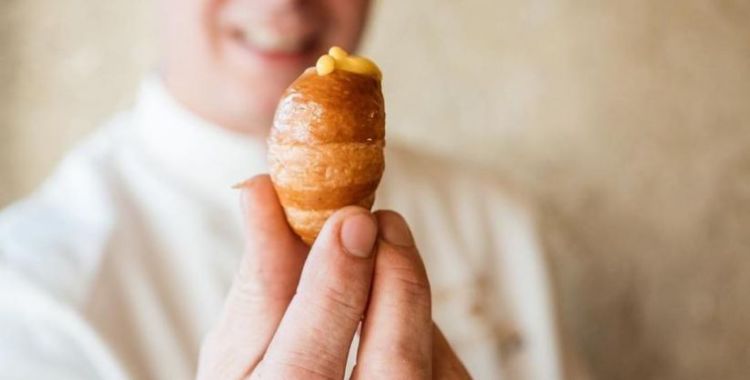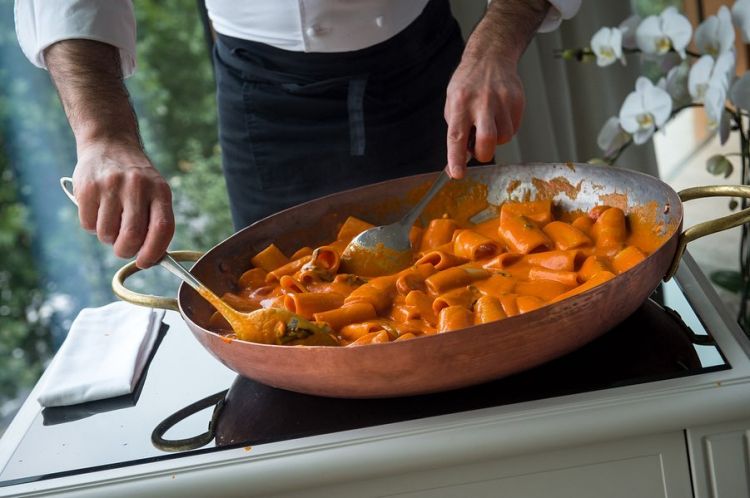"I remember one thing above all, from when I worked at Da Vittorio," a chef told us a while ago, that is "Chicco Cerea used to come and check how we were doing in the kitchen. And watch out: he didn't watch the preparations, the cooking, he didn't taste the sauces, he didn't test the salt point. No. Or rather: he certainly did that too, but afterwards. Instead, he would first open the rubbish bins to see what we had discarded, if we had wasted any raw material'.
Phone number. Driiiiiin (no longer driiiin, but that's just saying. Chicco Cerea answers, he's in Brusaporto, end of service).
Hi Chicco, is it true what they told us? That you check the rubbish bins...
“Very true. Always, daily. And even though the brigade knows it by now, I still find surprises: the other day a whole apple, very good but slightly rotten, when all I had to do was remove a small piece and the rest was perfect. I washed it well and ate it myself. I think I'm a calm person, but when I see food being thrown away I become a beast, I transform myself.” Chicco's thoughts are linked to environmental sustainability, the famous no-waste, but we now consider it from another point of view, that of the economic sustainability of signature cuisine, a debate we started here. "A product has to be used to its best advantage. A sea bass costs between 45 and 60 euro, depending on the season: so why use only a part of it, maybe not more than a third, as many colleagues do? Noooo, noooo: with the rest I invent, say, an excellent stuffing for ravioli. Or the saddle of lamb: you must trim it because when you serve it, shape and portion must be correct and aesthetics are also important. But the trimmings I discard are so tasty, woe betide if they are thrown away! I put them aside. There are always some hungry colleagues arriving at the end of the evening. Add a bit of bread and we eat together. And it comes naturally to me to turn off the lights when there is no need to keep them on. Or turn off the water tap. A great restaurant, just like a normal restaurant, is always based on prudent management.”

Cerea dismantles a false myth, the common belief that a fine-dining establishment, for example a three-starred restaurant like his Da Vittorio, must necessarily get in ebt, is condemned by its very format to lose money, because all the other activities on the side will then make ends meet. "No way. We are here almost 24 hours a day, we work like crazy, finishing the month with the accounts in order is not easy, the cost of personnel in Italy is crazy. But you must know how to manage the restaurant business because it's not at all impossible to make it profitable. It is true: we have now created a group, driven by the desire to do [How many restaurants are there? "Oh my God, I have to count them: in addition to this one, there are two in Milan, Portofino, Paris, St. Moritz, Asia with two in Shanghai and one in Saigon...” In short, there are eight, plus three patisseries, the laboratory, the catering... With almost a thousand direct and indirect collaborators, of which 210 in Brusaporto alone, and 500 with the Vicook galaxy etc., ed]. But woe betide if we weren't already making money with Da Vittorio! It wouldn't make sense. And I'm thinking of the Santini family, the friends of Dal Pescatore: they manage the business, they have their days off and live very well with just the three-starred restaurant, without having others.” You need management skills “that weren’t necessary in the past because Italian cuisine was born as a "grandmother's or mother's cuisine, often abroad we are still seen like that, while transalpine colleagues are recognised for their greater professionalism. But things are changing, indeed they have already changed, in recent years we have gained so much, so much ground.”
The basic principle is: “It can be fine dining, casual dining, trattoria, street food, whatever you want. Any format can be successful, the important thing, always, is that when people eat they can enjoy it. The food has to catch the eye, it has to stimulate, it has to give an emotion. Those who succeed, whatever kind of catering they want or knows how to do, win; if a customer leaves a restaurant and has no desire to return, you have failed.” An anecdote: “Last year, I was in a street in Saigon and I saw a little kiosk with an old lady frying little birds in clarified butter. I tasted them and I got goosebumps: they were crispy like biscuits, extraordinary. I can't wait to be there again and look for that old lady. In the same way, I remember the happiness at certain dinners in famous French maisons, pure haute cuisine, maybe thirty years ago. At Roger Vergé's for example.” Very different experiences, but equally unforgettable.

A famous - and playful - moment at Da Vittorio: the cannoncini being filled live
The theme, says Chicco, is therefore not trattoria vs. signature cuisine. Surely the latter must give something different, “whereas sometimes at the ungainly osteria you have more fun than at certain super-starred, super-premium locations.” Houston, we have a problem, “you go and sit there. They keep you there for hours but it's so fucking boring. It’s like they kidnapped you. It’s never ending.” (Chicco interrupts himself right here, he has to say goodbye to a table that is leaving, important customers. He goes back to his mobile phone: “Here I am again. It was the XXX, the ones from the clinics. They were the first table to arrive, at 12.05. They practically didn't want to leave, they just got up now, 4.28 pm. Why? Because they were fine, chatting, eating, enjoying themselves. "As soon as possible we'll come back", they told me'). He then continues: “I was saying that sometimes in the super-starred restaurant you never finish, you can't take it no more. Or they offer you dishes that are aesthetically perfect but dull, they lack soul.” In summary: “All cuisine, and therefore haute cuisine too, must first and foremost be heart.”
And it must evolve, “because sometimes you are still tied to certain clichés not of ten, but of forty or fifty years ago! I think of the strutting waiter behind your back, the thousand formalities, the service that interrupts you every five minutes to pour you a drop of wine. These things no longer make sense, in fact they are detrimental. Of course, wine must never be missing from the glass, it must be topped up at the right times. It takes attention. It takes personality. But it takes empathy above all. Let me give you an example: Paccheri alla Vittorio are one of our long sellers. There are still customers who, at the end, are almost intimidated, some shyly ask: "But can we do the scarpetta [scoop the sauce]? Really? Is that allowed?' Of course it's allowed!". In fact, it is almost compulsory: not so much and not only to do the scarpetta, but to enjoy the wonderful sauce and, in general, the gastronomic experience. “When I propose fried anchovies with tuna sauce [we wrote about it here, ed.], I invite you to pick it up with your finger. Then, of course, there must be a waiter who promptly brings you a napkin to wipe it off. But it's a nice, playful gesture that makes you relax: it's a fine dining experience, but I put you at ease as if you were among friends.”

The theatricality of the fine dining experience,
Chicco concludes, was once also represented in a thousand solemn rituals immersed in a detached environment; today, instead, it is linked to full interaction with the customer, to his involvement [as in the
Buongiorno Da Vittorio breakfast,
read here,
ed], “the waiter who welcomes you at the table, "good evening, I am
Antonello and I will have the pleasure of taking care of you tonight". Whereas at
Maxim's you used to be able to know the name of your waiter no earlier than the fifth or sixth time you went.”
A final doubt: is there an oversupply in fine dining? That is to say: we have so many excellent chefs, everyone wants to see stars, so the fine dining restaurants have multiplied while their potential audience has grown, but perhaps not so much... "I don't think so. If anything, there is a - positive - variety of offerings. If anything, the problem is that many are still too attached to fashion, which is a mistake I also made when I was young. There was the time of France, then Spain, more recently the Nordic cuisine, and then everyone was eating grass, mosses and lichens. That's all very well: but let's not run after these trends. If anything, let's follow our identity. When you have established it, you will be recognisable for that type of cuisine, and then you will be successful. Always if - this is the general premise - you know how to excite, i.e. make the diner happy.”
On saying goodbye, Chicco throws drops the hint: “We are also working on something new. Something even more long-lasting, something that can stand the test of time. But we'll talk about it when the time comes, for now I won't say anything.” There it is, the fine-dining crisis as seen by Chicco Cerea.
Translated into English by Slawka G. Scarso